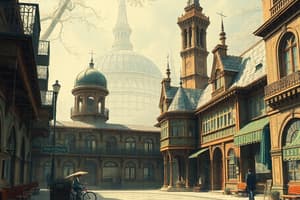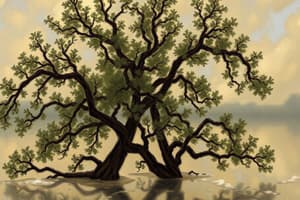Podcast
Questions and Answers
What is a primary source in historical research?
What is a primary source in historical research?
- A book analyzing historical events.
- A documentary film about an era.
- An article summarizing past events.
- A firsthand account such as a diary. (correct)
Which aspect is NOT considered in historical methodology?
Which aspect is NOT considered in historical methodology?
- Questioning the reliability of sources.
- Developing interpretations by analyzing evidence.
- Identifying bias in accounts.
- Creating fictional narratives. (correct)
How does studying history help in understanding present events?
How does studying history help in understanding present events?
- By predicting future occurrences with certainty.
- By interpreting events through a single viewpoint.
- By promoting a nostalgic view of the past.
- By providing context and perspective. (correct)
What significant development marks the transition from the Paleolithic Age to the Neolithic Revolution?
What significant development marks the transition from the Paleolithic Age to the Neolithic Revolution?
Which historical theme involves the study of governance and conflict?
Which historical theme involves the study of governance and conflict?
What characterizes the Medieval Period in European history?
What characterizes the Medieval Period in European history?
What defines a secondary source in the study of history?
What defines a secondary source in the study of history?
Which historical era is marked by major political, scientific, and social transformations?
Which historical era is marked by major political, scientific, and social transformations?
Flashcards
Primary Sources
Primary Sources
Direct accounts from the time period being studied, like diaries, letters, or original documents.
Secondary Sources
Secondary Sources
Interpretations or analyses of primary sources, often written by historians, journalists, or scholars.
Historical Methodology
Historical Methodology
The process historians use to analyze evidence, evaluate sources, and reach conclusions about the past.
Bias in Historical Sources
Bias in Historical Sources
Signup and view all the flashcards
Historical Significance
Historical Significance
Signup and view all the flashcards
Political Developments
Political Developments
Signup and view all the flashcards
Cultural Exchange
Cultural Exchange
Signup and view all the flashcards
Technological Advancements
Technological Advancements
Signup and view all the flashcards
Study Notes
Historical Periods
- History encompasses the entirety of past events and experiences.
- It's a complex and dynamic field, constantly evolving as new evidence and interpretations emerge.
- Historical periods are often categorized by dominant political structures, cultures, or technological advancements.
- Different cultures and societies have unique narratives.
Studying History
- Historians utilize primary and secondary sources to reconstruct the past.
- Primary sources are firsthand accounts, like letters or diaries.
- Secondary sources interpret or analyze primary sources to create broader narratives.
- Historical analysis involves interpreting sources critically and considering various perspectives.
Historical Methodology
- Historians employ historical methodology, which includes:
- Questioning the reliability of sources
- Identifying bias in accounts
- Developing interpretations by analyzing evidence
- This rigorous approach allows for a better understanding of the past.
Historical Significance
- Studying history is important for understanding present events and potentially shaping future directions.
- It provides context and perspective to current issues, enabling a more profound understanding.
- Examining past errors and achievements provides insights and lessons learned.
- It nourishes empathy and allows for a deeper appreciation for human diversity.
Major Historical Themes
- Political Developments: Analysis of power, governance, and conflict throughout history.
- Economic Systems: Study of trade, production, and resource management across different eras.
- Social Structures: Understanding the roles, hierarchies, and relations within societies.
- Cultural Exchange and Transformations: Exploration of interactions, diffusion, and shifts in beliefs, customs, and art.
- Technological Advancements: Examined to understand how innovations have transformed human life and societies.
Examples of Historical Eras
- Paleolithic Age: Characterized by early human development and hunter-gatherer societies.
- Neolithic Revolution: Introduction of agriculture and settled life.
- Ancient Civilizations: Rise of early empires and advanced societies in various parts of the world.
- Medieval Period: Significant developments in Europe, including the rise of Christianity and feudalism.
- Renaissance: Revival of arts, sciences, and learning in Europe.
- Modern Period: Marked by major political, scientific, and social transformations.
Studying That Suits You
Use AI to generate personalized quizzes and flashcards to suit your learning preferences.
Description
Explore the complexities of history, including its periods and the methodologies historians use to analyze events. This quiz covers the importance of primary and secondary sources, as well as the critical questioning of historical narratives. Test your understanding of how history is reconstructed through evidence and interpretation.




